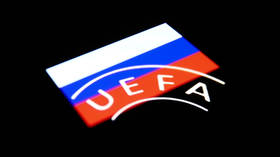Facebook’s new expert on ‘online disinformation’, Ben Nimmo, was a fantasy fiction writer. Has he really given that up?

The tech giant’s self-styled ‘troll-finder-general’ is touted as an authority on alleged Russian ‘information warfare’ – but any objective look at his background and track record raises troubling questions over his capabilities.
On February 5, Ben Nimmo announced he will with immediate effect be joining Facebook, to help the social media monopoly “lead global threat intelligence strategy against influence operations.”
It’s a shocking development, yet somehow an entirely unsurprising one. After all, despite having less than no discernible professional or educational background in social media, data analysis, information technology, or digital research, in recent years he’s enjoyed a stratospheric rise to mainstream prominence as an expert on online “disinformation,” and a series of well-remunerated posts at a number of state-backed and quasi-state organizations.
Also on rt.com Facebook's latest troll-hunt in Africa leads them to point to FRANCE – first NATO country to get the honorQuite some career path for a student of medieval European epic literature who toiled as a scuba-diving teacher and travel writer for many years after leaving university, when his dream of authoring fantasy fiction didn’t get off the ground.
A fawning New York Times hagiography published in February 2020 – replete with bizarre ‘lifestyle’ photos of the subject in the great outdoors, a presumably rare occurrence given his obsession with the online realm – documents Nimmo’s precipitous ascent to ‘troll-finder-general’, and how he uses ‘open source’ web tools to identify disinformation and its disseminators, in some detail.
Strikingly though, it is acknowledged that his crusading efforts are often a complete waste of time. For instance, the article records how he once spent over seven hours “chasing leads on Iranian disinformation related to the killing of General Suleimani,” intensively probing the output of social media accounts on several platforms he believed to be “suspicious,” for reasons unstated. Having unearthed no “definitive evidence” of any such Iranian-government campaign whatsoever, he eventually gave up and went to bed “after 2 am.”
To be fair, Nimmo is quoted as saying “determining when material is coming from regular people expressing a point of view or from a coordinated system linked to a government” is “difficult,” raising the obvious question of why he bothers doing so, and how he can ever be sure his suspicions are correct.
It’s unclear if he conducts such fruitless late-night fumbling in his free time, or on his employer’s plentiful dime, but then again the effusively glowing profile also glosses over, distorts or simply omits other vital aspects of Nimmo’s resume.
Also on rt.com Media linking NHS leak to Russia is absurd, but using the Atlantic Council & Ben Nimmo as the source is journalistic malpracticeIn particular, there is no mention of his stint with Integrity Initiative, a secret UK Foreign & Commonwealth Office (FCO) information warfare operation staffed by military intelligence veterans. Its parent ‘charity’, the Institute for Statecraft, is however mentioned in passing – somewhat amazingly, it's referred to as a “pro-democracy think tank,” by any objective measure a mischaracterization of the most Orwellian kind.
After leaving the Institute – where he earned up to £5,000 monthly for peddling a variety of dubious conspiracy theories about Russian meddling, via various public fora – he joined NATO propaganda arm the Atlantic Council, establishing its Digital Forensic Research Lab to “operationalize the study of disinformation by exposing falsehoods and fake news.”
Concurrently, Nimmo became an early proponent of the notion the Kremlin was using social media to influence voters to support Donald Trump in the 2016 presidential election, which after the candidate’s shock win, became widely embraced in the Western mainstream, in turn boosting the DFR Lab founder’s media profile significantly.
In October 2018, however, an analysis published by Nimmo of thousands of alleged Russian “troll” and “bot” accounts which purportedly engaged in a Twitter “influence operation” in support of Trump, found their activities “had little to no discernible impact” on voters, with “no evidence to suggest they triggered large-scale changes in political behavior.”
These critical admissions were predictably entirely ignored by the media, with many outlets citing Nimmo’s appraisal as proof of highly effective pro-Trump Russian interference in the presidential election.
That same month, Facebook closed down 559 pages and 251 personal accounts without warning, for reportedly breaking rules on “spam and coordinated inauthentic behavior.” It was just the latest mass-defenestration on the social network, conducted under the auspices of Facebook’s ‘anti-fake news’ partnership with the Atlantic Council.
Launched in May 2018, the compact granted the “think tank” – and Nimmo – exclusive and unprecedented access to private user data, in order to identify and study “disinformation networks,” then earmark particular accounts and pages for deletion and banning.
The partnership got off to a highly inauspicious start – a number of accounts Nimmo identified as Kremlin-directed ‘bots’ and ‘trolls’ subsequently banned by social networks turned out to be real people with opinions Nimmo seemingly just disliked, among them a British pensioner.
Similarly, many other pages shut down at Nimmo’s behest subsequently weren’t involved in the business of disseminating disinformation or in any way connected to Russia, but rather belonged to independent journalists and news outlets, many of which covered issues often ignored in mainstream outlets, such as police brutality, racism, and militarism, and had tens if not hundreds of thousands of followers.
Facebook – along with the UK FCO, US State Department, defense sector giant Raytheon, and Ukrainian oligarch Victor Pinchuk – is coincidentally one of the Atlantic Council’s biggest funders. It also donates indeterminate sums to Graphika, which Nimmo joined in 2019.
Graphika – which self-effacingly declares itself “the best in the world at analyzing how online social networks form, evolve, and are manipulated” – counts among its partners the Pentagon, Defense Advanced Research Projects Agency, and the Senate Select Intelligence Committee. The company repeatedly made headlines after he was hired, often at mysteriously convenient junctures.
For instance, just prior to the December 2019 UK General Election, then-opposition leader Jeremy Corbyn revealed a 451-page document containing details of secret negotiations between London and Washington, some of which covered the privatization of the UK National Health Service. Within days, Graphika published a report explosively claiming that the document’s leak, and Corbyn’s promotion of it, were part of a sinister and shadowy Russian information operation.
While the analysis, authored by Nimmo, was rife with caveats – the release of the document merely “closely resembled” a previous alleged Russian information operation, and Graphika lacked “all the data” that would allow the firm to “make a final determination in this case” – its avowedly unsupported headline allegation was seized upon by news outlets in many countries.
Similarly, in September 2020, the mainstream media became abuzz with allegations that obscure website PeaceData, which republished content from independent media platforms without permission, was likewise part of a sinister and wide-ranging Kremlin conspiracy to sway the impending presidential vote in Trump’s favor anew.
Also on rt.com In Western media, publishing fake news about Russia is a good career move… with no consequencesThe primary source for these claims was, yet again, analysis published by Graphika. While heavy on imposing graphs and screengrabs, an extensive Grayzone Project report raised serious questions about PeaceData’s true origins and nature, among other things noting that the site received virtually no traffic, republished little content related to the election, accrued just 197 ‘likes’ on Facebook during its operation, and the handful of Twitter accounts linked to its alleged staff gained virtually no followers.
Quite some connivance. One needn’t be a cynic to question whether the threat and dimensions of disinformation have been consciously and cynically over-exaggerated, and exploited for political reasons and financial gain.
It’s certainly hard to reach any other conclusion from reading the Center for European Policy Analysis’ (CEPA) August 2016 report, Winning the Information War, which concluded that without decisive action – including literally subjecting citizens who’d “fallen victim to Kremlin propaganda” to the same methods used to “deradicalize far-right extremists and jihadists” – “democracy will quickly become difficult, if not impossible.”
Money from governments, social media platforms, universities, media outlets and more has certainly flowed apace into anti-disinformation endeavors in the years since CEPA’s fiery call to arms. One example is Open Information Partnership (OIP), which is funded to the tune of millions by the UK FCO.
While presented as an effort to strengthen civil society and promote the values of truth and democracy, leaked documents make clear it in fact seeks to covertly further Whitehall’s global policy objectives, by influencing “elections taking place in countries of particular interest to the FCO” and maintaining networks of ‘astroturf’ citizen journalists and related initiatives to perpetuate propaganda.
Strikingly, the papers indicate that Nimmo may sit, or have sat, on the project’s “advisory panel” – and one file contains a highly illuminating passage indeed.
“[One] barrier to combating disinformation is the fact certain Kremlin-backed narratives are factually true,” it states. “Responding to inconvenient truths, as opposed to pure propaganda, is naturally more problematic.”
Ironically, that so much is being invested in counter-disinformation efforts may be an “inconvenient truth” for none other than Nimmo himself.
Also on rt.com Democrat advice for ‘combating online disinformation’ is common sense buried under hypocrisy and censorshipHis aforementioned New York Times profile concludes by noting that the former Integrity Initiative propagandist is concerned over the vast sums “pouring into efforts to examine disinformation,” as they may serve as an incentive for researchers new to the field “to sensationalize material that cannot be accurately attributed.”
Evidently, having worked so long and hard to concoct such a profitable phantom monster, Nimmo doesn’t want any upstarts muscling in on his turf.
Think your friends would be interested? Share this story!
The statements, views and opinions expressed in this column are solely those of the author and do not necessarily represent those of RT.














